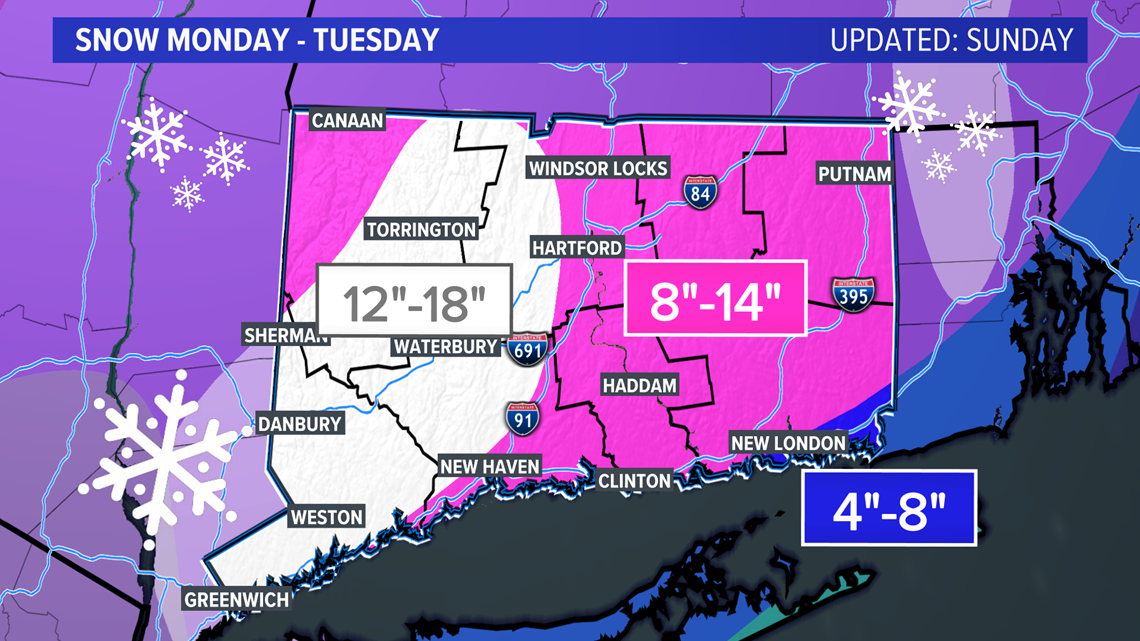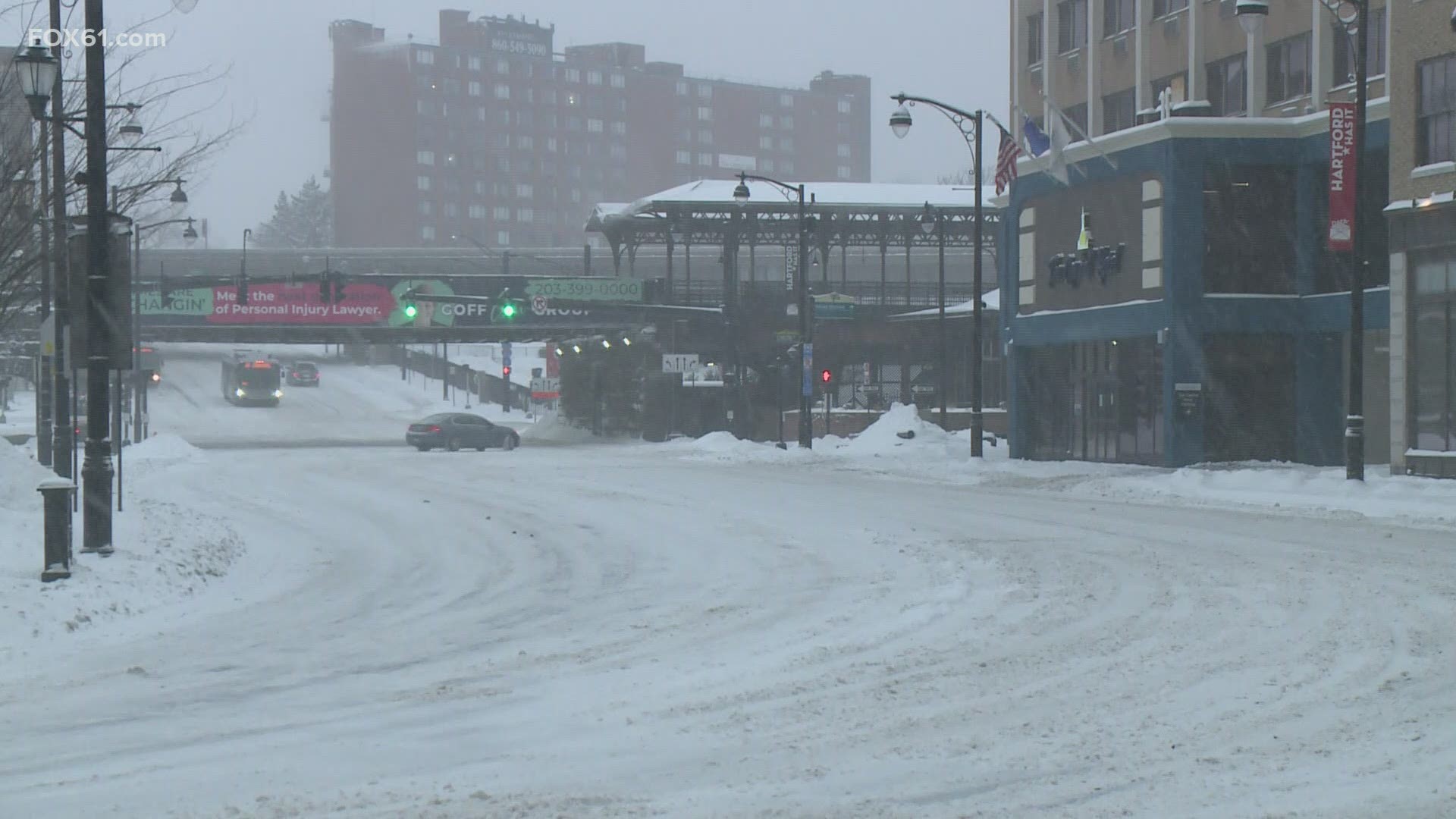HARTFORD, Conn —
Tuesday, February 2
New Haven food distribution canceled today.
Mayor Elicker has said that all school food distribution is canceled today and that all COVID-19 vaccination clinics are closed.
Yale New Haven Hospital delays/closes vaccine and testing sites.
COVID-19 Vaccine Sites: Closed 2/2.
COVID-19 Test Sites: Plan to reopen at noon 2/2.
Outpatient Appointments: Call ahead to confirm.
Emergency Departments: Open 24/7
Please visit ynhhs.org for additional information.
Monday, February 1
Metro-North
Check here for the latest status on your train.


Ski Sundown was expecting to close at 4pm. Ski Southington expected to close at 5pm.
The Superintendent of Schools in Easton had a little fun with his announcement Monday
State Offices Closed, EOC activated
Governor Ned Lamont announced Sunday that he is ordering all executive branch state office buildings closed to the public on Monday, and activated the state's Emergency Operations Center.
“This appears to be a significant storm that is about to impact our state, and snowfall is expected to reach rates at times of up to one to two inches per hour, causing whiteout conditions that will make it unsafe to be out on the roads,” Governor Lamont said. "I strongly encourage everyone in Connecticut to stay off the roads unless absolutely necessary, particularly during the height of the storm when these fast snowfall rates will make it dangerous to be on the roads.”
COVID testing and vaccinations
Community Health Center, Inc. (CHC) is suspending all outdoor drive-through testing for COVID-19 at its multiple locations around the state. Also, the Pratt & Whitney Vaccination Clinic in East Hartford is closed Monday.
Hartford Healthcare says that their testing site at Bradley Airport will be closed on Monday; as of 5 p.m. Sunday, drive-up testing sites are scheduled to be open 8am-1pm. Find full details here.
In Gov. Lamont's briefing he said that he didn't expect the vaccine would go to waste, since it would still be able to be stored at the proper temperature. Vaccination sites had back up generators for power should they need it, he said.
Transit and Travel Alerts
Governor Lamont announced that "in collaboration with our neighboring states, we are implementing a travel ban on certain tractor-trailers" in Connecticut.
He has signed an order amending the travel ban on certain tractor trailers that was issued yesterday evening and went into effect early this morning.
Trucks carrying COVID 19 vaccine were exempt.
Effective immediately, the amended order bans:
- All empty and tandem tractor trailers from traveling on all limited access highways statewide; and
- All tractor trailers from traveling on Interstate 84.
Metro-North will cease service on the New Haven and Waterbury lines Sunday night; you can find times for the last trains here.
AAA was preparing for the storm after a string of cold days. “The cold has been killing car batteries for days and now AAA expects the snow to ‘pile on’ to the number of calls we get from stranded members,” says Amy Parmenter, spokesperson for AAA in Greater Hartford. “AAA is encouraging anyone who can stay home during the height of the storm to do so. For those who must be on the road, it is critical that their vehicles are winter road-ready and that they take every precaution to get where they are going as safely as possible.”
Clear the fire hydrants
The Regional Water Authority (RWA) is reminding residents to clear their hydrants as they start to think about a snow removal plan.
Access to fire hydrants is critical to firefighters and public safety.
- Be sure to clear snow and ice.
- Clear 3-feet in all directions around the hydrant.
- Clear a path from the hydrant to the street.
- Help a neighbor in need of snow removal assistance if possible.
AAA Winter Weather Driving Tips:
According to research by the AAA Foundation for Traffic Safety, winter storms, bad weather and sloppy road conditions are a factor in nearly half a million crashes and more than 2,000 road deaths every winter.
- Slow down – whenever there’s a change in conditions, it’s critical that all drivers adjust their driving behaviors accordingly
- Drive Defensively – increase following distance, which will allow more time to react if you or the driver in front of you loses control
- Limit distractions – always. But in bad weather, drivers should be looking ahead in anticipation of any unexpected changes in road conditions or traffic.
- Never use cruise control – drivers want to maintain full control of vehicle when roads are wet or snow covered
- Turn on headlights – so you can see and be seen
- If you do skid or lose control, always look and steer in the direction you want the vehicle to be headed
UCONN classes canceled
UConn is canceling all online and in-person classes on Monday, Feb. 1st at all campuses, with the exception of UConn Health. Essential employees will still report to their work sites, such as public safety and facilities workers.
Updates will be provided on the University’s UConn Alert site at: alert.uconn.edu
Utilities Preparing
“We’ve been watching this storm for days and will adjust our plan accordingly,” said Eversource President of Regional Electric Operations Craig Hallstrom. “The forecasts call for large amounts of snow and high winds, which may make travel conditions challenging for the crews. We’re checking our equipment and supplies and staging the crews at our work centers across the state to ensure we’re ready to repair any damage we may see from this storm. We also remind customers that restorations may take longer as we ensure the safety of our employees and customers while continuing to work under the challenging conditions related to the pandemic.”
The Red Cross had these reminders
WHAT YOU SHOULD DO
- Assemble an emergency preparedness kit: Pack a winter-specific supply kit that includes a warm coat, hat, mittens or gloves, and water-resistant boots, along with extra blankets and extra warm clothing for each family member. Sand or non-clumping cat litter is good to have on hand to help make walkways or steps less slippery. Additionally, make sure you have a first aid kit and a supply of essential medications, canned food and can opener, bottled water, flashlights and a battery-powered radio with extra batteries in your home in the event of a power outage.
- Protect pipes from freezing.
- Caulk and weather-strip doors and windowsills to keep cold air out. Install storm windows or cover windows with plastic from the inside to provide an extra layer of insulation to keep cold air out.
- Make sure you have enough heating fuel on hand. Conserve fuel. Winter storms can last for several days, placing great demand on electric, gas, and other fuel distribution systems (fuel oil, propane, etc.).
- Stay indoors and wear warm clothes. Layers of loose-fitting, lightweight, warm clothing will keep you warmer than a bulky sweater. If you feel too warm, remove layers to avoid sweating; if you feel chilled, add layers.
- Check on relatives, neighbors and friends, particularly if they are elderly or if they live alone.
Hartford HealthCare-GoHealth Urgent Care Tips
- Pay attention to the heart.
Rates of heart attacks rise by as much as 30% in the coldest months of the year. This is due to several factors. First, cold weather causes an increase in blood pressure and cholesterol, which are both risk factors for heart disease. Second, in cold weather people often engage in exertional activities like skiing and snow shoveling, which puts an added strain on the heart. And third, people often indulge in alcohol and sugary, fatty foods during winter holidays, which can worsen chronic health conditions like diabetes, and cause heart arrhythmias and heart attacks.
“It’s very important during the winter months that residents with heart issues lower as many cardiac risk factors as possible,” said Dr. Walsh. “Residents should remember to seek immediate medical attention if they have any symptoms of a heart attack, including chest pain, arm tingling or numbness, jaw pain, shoulder pain, nausea, dizziness or increased sweating.”
Use good body mechanics when shoveling.
During winter months, tens of thousands of people sustain injuries to their necks, backs, shoulders, hips, knees and ankles while shoveling snow. Because shoveling can cause some of the most common winter injuries, it is important to use good body mechanics while doing the lifting, bending and twisting motions that shoveling entails. For example, Connecticut residents should focus on maintaining a straight back instead of rounding when bending to shovel snow.
“Shoveling properly with the legs, instead of the back, can make a big difference in terms of injuries this winter,” said Dr. Walsh. “And it’s very important that nobody with respiratory issues shovel snow or overly exert themselves removing snow.”
Play winter sports safely.
While winter provides the opportunity for an abundance of fun outdoor activities, it also comes with an increased risk of sports-related injuries. In fact, according to OrthoInfo.org, more than 200,000 people sought medical care for winter sports-related injuries in 2018. Because skiing, snowboarding, ice skating and sledding are the most common causes of winter injuries, it is important to take precautions when engaging in these activities and wear appropriate safety gear when indicated.
Dress for the weather.
According to a study published in the journal Environmental Research, every year cold weather also causes more fatalities in the U.S. than hot weather according to GoHealth Urgent Care. One of the most effective ways to prevent hypothermia-related injuries is to be aware of the weather forecast, and dress accordingly. In addition to wearing warm clothes and an adequate coat, it is important to protect the head, face and hands when outdoors.
Be mindful of footing when walking in the winter elements.
The National Safety Council estimates that there are nearly 9 million ER visits each year from slip-and-fall accidents, which are more likely to occur during winter months when ice, rain and snow create dangerous conditions. It is important to take precautions by shoveling and salting walkways. Also, if spending time outdoors, Connecticut residents can decrease the risk of a slip-and-fall injury by wearing sturdy footwear and carefully watching where they’re stepping.
Watch More: Weather Watch

